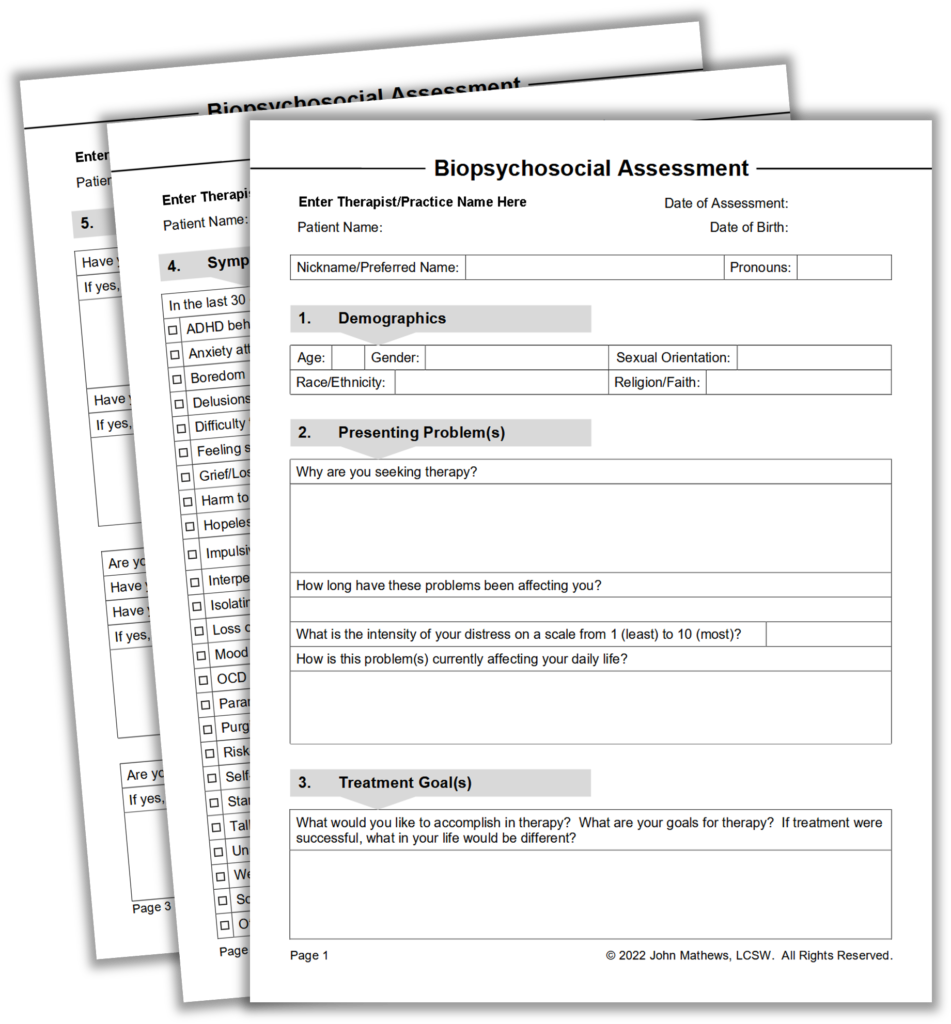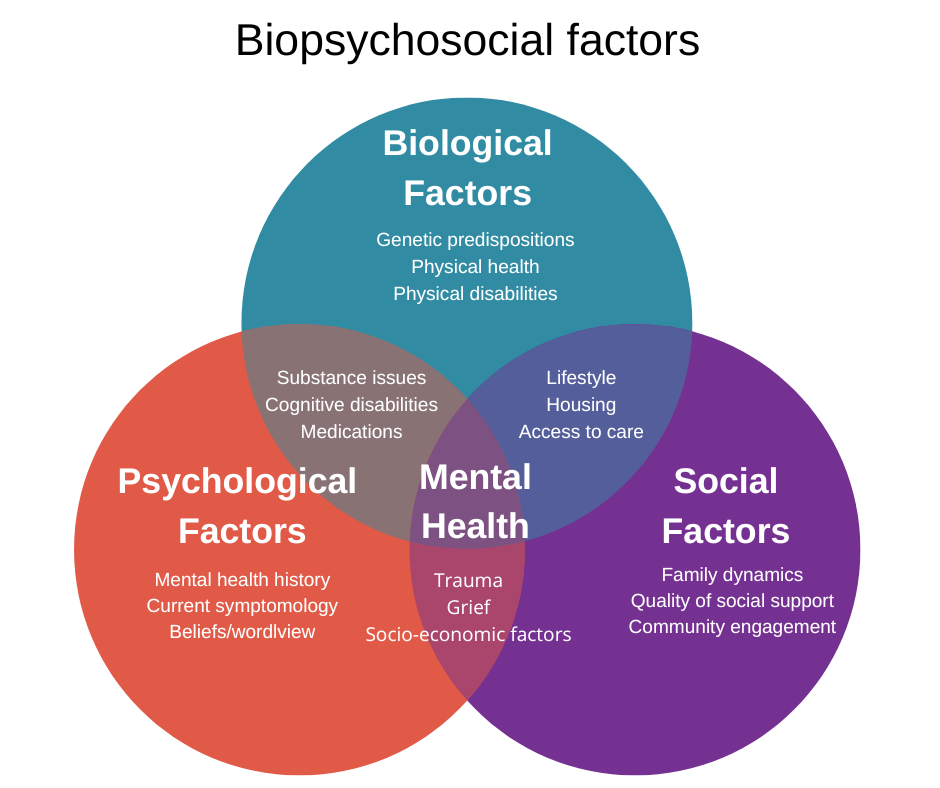Biopsychosocial Assessment Template (PDF) Download
A biopsychosocial assessment is a holistic assessment used by health professionals to learn about their clients through the assessment of the biological, psychological, and social factors that are leading the client to treatment. Because of the breadth of this assessment, most therapists, clinicians, and other health professionals use a biopsychosocial assessment template.
Download our biopsychosocial assessment template
Download our entire Notes Template Bundle
First proposed in 1977 by George Engel and since expanded, the biopsychosocial assessment template has become one of the most popular templates for clinical assessments for social workers, psychologists, psychotherapists, doctors, and more, and for good reason — it helps the clinician to gain a comprehensive understanding of the client’s mental health through the assessing of how various aspects of the client’s health interact with one another. A depiction of the interaction between biological, psychological, and social factors can be seen in the Venn diagram below.
What is a biopsychosocial assessment?
The holistic nature of the biopsychosocial assessment allows the clinician to answer the question of what is going on in the client’s life at the time of treatment, rather than simply asking what is wrong with the client.
The model contrasts the biomedical model which is based on the underlying assumption that good health is defined by the lack of illness. The biomedical model can be traced all the way back to the 400BC “father of medicine” Hippocrates, who advocated for a purely physical understanding of illness. The biomedical model became the predominant medical model in the Western World during the Scientific Revolution of the 1800s and remains as such to this day. However, a body of research suggests that the narrow scope of the biomedical model may hamper successful outcomes as it does not account for social or psychological health.
Meanwhile, the biopsychosocial model has been gaining increasing acceptance in medical communities for its ability to help providers understand the full scope of the client’s experience.
We’ll now take a look at the components which make up the biopsychosocial assessment.
Biological factors
Biological factors that may influence mental health include:
- Physical health (including chronic or acute illness)
- Physical disabilities
- Genetic predispositions
Biological-psychological factors may include:
- Substance issues
- Cognitive disabilities
- Medications.
Biological-social factors may include present or past lifestyle including diet, exercise, and sleep habits, stability and quality of housing, and access to medical care and needed physical resources.
Download my Biopsychosocial Assessment Template
Click here to download our biopsychosocial assessment template
Click here to download our intake note template
Download our entire Notes Template Bundle
Psychological factors
Any history of mental health issues
- Current symptomology including mood and affect
- Thoughts and beliefs which may benefit or detract from psychological well-being
- Self-esteem/body image
- Personality
- Stage of life
Psychological-social factors may include:
- Trauma
- Grief
- Finances
- Socio-economic issues including education, occupation, safety concerns
Social factors
Social factors that may influence mental health include:
- Family dynamics
- Family history
- Relationships
- Quality of current or past social support
- Degree of community engagement
How to conduct an assessment using a Biopsychosocial Assessment Template
The biopsychosocial model is designed to aid the therapist with clinical formulation by specifically addressing the major factors that contribute to the client’s overall mental health: biological, psychological, and social factors. The goal of clinical formulation is two-fold:
- Understand how the client got to be the way he or she is
- Identify the best way of helping the client
Using a Biopsychosocial Assessment Template can help
Because of the breadth of a biopsychosocial assessment, most therapists use a template to organize the assessment process. While the order of some of the assessment components may vary from one template to the next, there is a general consensus on the content that should be included in a biopsychosocial assessment. Let’s go through the sections of a sample assessment.
Download my Biopsychosocial Assessment Template
Click here to download our biopsychosocial assessment template
Click here to download our intake note (with biopsychosocial assessment) template
Download our entire Notes Template Bundle
Demographics
The client demographics section includes the following details.
- Client’s name
- Date of birth
- Age
- Gender
- Sexual orientation
- Race
- Ethnicity
- Religion or faith
Presenting Problem(s)
The presenting problem may include:
- The reason why the client is seeking therapy
- How long these problems have been affecting the client
- The intensity of the client’s distress
- How the client’s problem(s) are affecting his/her/their daily life
Treatment Goal(s)
The treatment goals section may include:
- What the client would like to accomplish in therapy
- How the client’s life would be different if treatment were successful
Symptoms
The symptoms section helps the therapist to determine which symptoms the client has been experiencing in the recent past. It may feature:
- A symptoms checklist
- A write-in box for any symptoms
Mental Health
The mental health section may include:
- Any mental health services that the client has received in the past
- Any past or current mental health diagnoses
- Risk assessments (suicide, homicide, and harm to self or others)
- Questions about abuse, trauma, and grief
Lifestyle
The lifestyle section may include:
- Exercise habits and routines
- Sleep habits
- Eating/dietary habits, issues, or restrictions
- Substance use and/or addictions
Medical
The medical section may include:
- Psychiatric history
- Mental health diagnosis
- Any mental health hospitalizations
- Current medications
- Pregnancy
- Any acute or chronic medical conditions
Personal
The personal section may include (if applicable):
- Education background
- Student status and performance
- Current employment
- Employment history
- Retirement
- Military status and experience
- Living arrangements
- Homelessness
- Legal issues
- Financial issues
- Strengths
- Limitations
Relationship, Family, and Friends
The relationship, family, and friends section may include:
- Current relationship status
- Family relationships
- Friend/peer relationships
- Community engagement
Using the Biopsychosocial Assessment Template for Documentation
Most therapists use a template to conduct and document the assessment. A well-formatted, comprehensive, and easy-to-use biopsychosocial assessment template can make the process smooth and professional.
Since most biopsychosocial assessments are conducted during the client’s intake or assessment appointment, some templates are integrated with an intake note. The intake note section of the template includes additional items such as session information, intake discussions, a mental status exam, diagnosis, treatment plan status, plan for next appointments, and the therapist’s signature.








